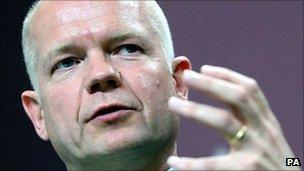William Hague: Euro is a burning building
- Published

UK Foreign Secretary William Hague has said the euro is "a burning building with no exits" for some of the countries which adopted the currency.
Mr Hague first used the expression when he was Conservative leader in 1998 - and said in an interview with the Spectator he had been proved right.
Commission President Manuel Barroso has said the EU faces "its greatest challenge" in tackling Greek debt.
He has also proposed an EU financial transactions tax, rejected by the UK.
Eurozone countries are continuing to struggle with the repercussions of Greece's debt crisis.
Mr Hague, who ran a "Keep the Pound" campaign when he was Conservative Party leader, told the Spectator that Europe was now having to deal with the fallout from the decision to create the single currency.
'Too much power'
"It was folly to create this system. It will be written about for centuries as a kind of historical monument to collective folly. But it's there and we have to deal with it," he said.
"I described the euro as a burning building with no exits and so it has proved for some of the countries in it," he said.
"I might take the analogy too far but the euro wasn't built with exits so it is very difficult to leave it."
A group of Eurosceptic Conservative MPs has formed to try to reshape the UK's relationship with Europe. It expects there will be further EU treaty negotiations in the event of calls for more economic integration - and wants the UK to be ready to try to win back some powers in return.
In the Spectator article Mr Hague said the EU had "too much power" and "there should be powers that are returned to this country".
"I think we should be clear in the Conservative Party that that is where we are heading."
But he added that anything done while in coalition government with the Liberal Democrats would have to be discussed with the other party.
Mr Hague also said in the interview that Europe was likely to be "one of the dividing lines between the coalition parties, put forward at the next election".
The Lib Dems have traditionally been the most pro-European of the three biggest UK parties and concerns were voiced by senior figures about increasingly Eurosceptic voices from some of their coalition partners, at last week's Lib Dem conference.
'Greatest challenge'
Mr Hague's interview was published after Mr Barroso gave a speech appealing for patience over the Greek debt crisis. He said Greece would remain within the eurozone and it was possible and necessary to overcome the "greatest challenge our union has known".
But the UK has said it would not support a European Commission proposal for an EU-wide financial transactions tax. A Treasury source told the BBC it would "absolutely resist" any tax that was not introduced globally.
City of London officials have said that about 80% of the revenues of any Europe-wide financial tax would come from London.
UK Independence Party leader Nigel Farage said it would "devastate" Britain's biggest industry, including insurance and fund management. He told the BBC: "David Cameron needs to say today loudly and clearly that he's against it in principle and he will not accept it in any circumstances."
And there has been criticism of Mr Barroso's argument that the response to the crisis in the eurozone must be to deepen economic integration including the issuing of eurobonds - shared debt obligations.
The Eurosceptic Conservative MEP Daniel Hannan told the BBC: "We are treating it with exactly the medicine that sickened the patient in the first place. The problem was too much debt and the EU is trying to solve the problem with more debt, pushing new liabilities onto countries that couldn't meet their existing liabilities."
- Published28 September 2011
- Published28 September 2011
- Published19 September 2011
- Published12 September 2011